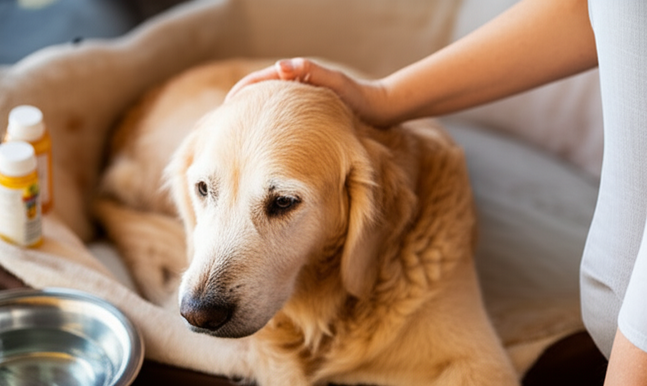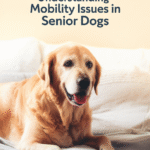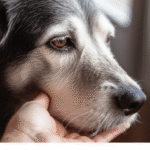Recognizing the Shift: Understanding Your Senior Dog’s Changing Needs
As your canine companion enters their senior years, recognizing the subtle shifts in their behavior and physical condition becomes crucial. A decrease in activity is a common sign of aging, often accompanied by a decrease in muscle mass and metabolism.1 This metabolic slowdown can influence their dietary needs, potentially leading to weight gain if their food intake isn’t adjusted.2 Age-related health issues, such as arthritis, can also impact mobility and appetite.3 Being attuned to these changes allows you to adapt their care, including nutrition, to ensure their continued comfort and well-being. Prioritizing senior dog health through essential screenings can also help detect and manage age-related conditions effectively.4
Nutrient Needs of the Golden Years: Essential Vitamins and Minerals for Senior Dogs
As your dog enters their golden years, their nutritional needs change. Ensuring they receive the right balance of vitamins and minerals becomes crucial for maintaining their health and vitality. Senior dogs often benefit from increased protein intake to support muscle mass, which can be achieved with high-quality senior-specific dog food.5 Fiber also plays a vital role in their digestive health, promoting regularity and preventing constipation.2 Incorporating healthy fats, like omega-3 fatty acids, can help reduce inflammation, support cognitive function, and maintain healthy skin and coat.6 Other essential nutrients, such as glucosamine and chondroitin, can support joint health and mobility.7 Always consult with your veterinarian to determine the best diet and supplements for your senior dog’s individual needs.4
Tailoring the Diet: Choosing the Right Food for Your Senior Dog
As your dog enters their golden years, their nutritional needs change. Choosing the right food is crucial for maintaining their health and well-being. Dry kibble offers convenience and dental benefits, while wet food can be more palatable for picky eaters or those with dental issues.8 Homemade diets allow for complete control over ingredients but require careful balancing of nutrients.9 Reading food labels is essential. Look for the Association of American Feed Control Officials (AAFCO) statement to ensure the food meets nutritional standards.10 Prioritize high-quality protein sources and consider supplements like glucosamine and chondroitin for joint health.7 For a deeper dive into senior dog nutrition, explore our guide on choosing the best dog food.11
Addressing Common Issues: Dietary Management of Health Problems in Senior Dogs
Senior dogs often experience health issues like arthritis, kidney disease, and diabetes, which can be managed with dietary adjustments. For arthritis, consider a diet rich in omega-3 fatty acids12 to reduce inflammation and pain.3 For kidney disease, a low-phosphorus diet is crucial13 to lessen the workload on the kidneys. Finally, diabetic dogs benefit from diets high in fiber and complex carbohydrates, which help regulate blood sugar levels.14 Consult your veterinarian to create a tailored dietary plan to address your senior dog’s specific needs.4
Transitioning with Care: Making Gradual Dietary Changes for Your Senior Dog
When transitioning your senior dog to a new diet, gradual changes are key to avoiding digestive upset. Start by mixing a small amount of the new food with their current food.15 Slowly increase the proportion of new food over 7-10 days,16 monitoring your dog for any signs of digestive problems like vomiting or diarrhea. If your dog experiences digestive issues, slow down the transition process. For dogs with sensitive stomachs, consider a specifically formulated sensitive stomach food to ease the transition.17 Maintaining a consistent feeding schedule18 can also help regulate their digestive system and make the transition smoother. Remember, patience is crucial during this process. By taking a gradual approach, you can ensure a comfortable and successful dietary change for your beloved senior companion. For more information on senior dog health, visit our articles on essential screenings4 and managing arthritis.3
Sources
- Today’s Veterinary Practice – Canine Geriatric Care, Part 1: The Aging Dog—Client Education & Early Detection; Nutrition
- VCA Animal Hospitals – Dog Nutrition: Senior Dogs
- DogsCare.life – Managing Arthritis in Senior Dogs: A Comprehensive Guide
- DogsCare.life – Prioritizing Senior Dog Health: A Guide to Essential Screenings
- Whole Dog Journal – Senior Dog Nutrition Tips
- American Kennel Club – Senior Dog Nutrition
- DogsCare.life – Dog Joint Supplements: A Guide to Healthy Canine Joints
- ASPCA – Senior Dog Care
- Cummings Veterinary Medical Center at Tufts University – Homemade Diets for Dogs and Cats
- AAFCO – Reading Labels
- DogsCare.life – The Ultimate Guide to Choosing the Best Dog Food
- National Library of Medicine – Omega-3 Fatty Acids in Inflammation and Autoimmune Diseases
- Veterinary Information Network – Nutritional Management of Chronic Kidney Disease
- National Library of Medicine – Role of Diet and Exercise in the Management of Canine Diabetes
- American Kennel Club – Switching Dog Food: How to Do It Right
- VCA Animal Hospitals – Dog Nutrition: Changing Your Dog’s Food
- The Farmer’s Dog – Sensitive Stomach Dog Food
- Purina – Dog Feeding & Care


